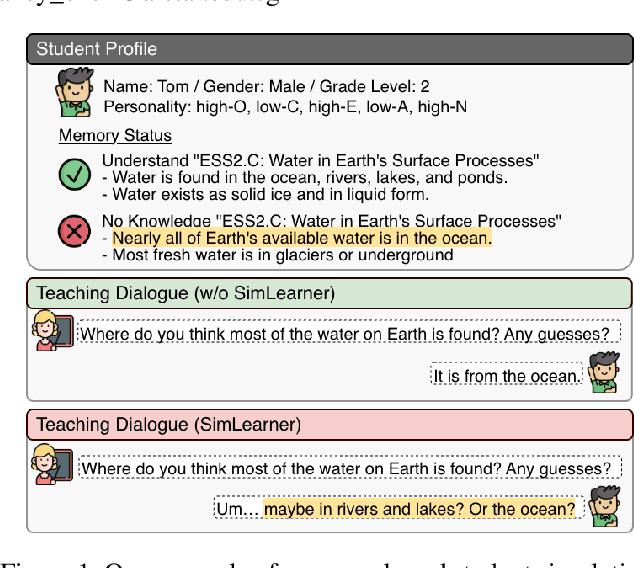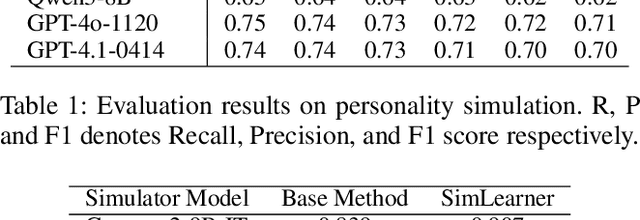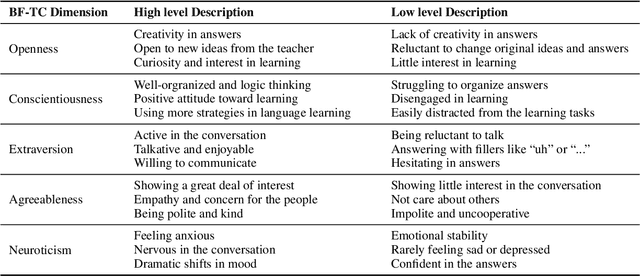Stella Xin Yin
The Imperfect Learner: Incorporating Developmental Trajectories in Memory-based Student Simulation
Nov 08, 2025



Abstract:User simulation is important for developing and evaluating human-centered AI, yet current student simulation in educational applications has significant limitations. Existing approaches focus on single learning experiences and do not account for students' gradual knowledge construction and evolving skill sets. Moreover, large language models are optimized to produce direct and accurate responses, making it challenging to represent the incomplete understanding and developmental constraints that characterize real learners. In this paper, we introduce a novel framework for memory-based student simulation that incorporates developmental trajectories through a hierarchical memory mechanism with structured knowledge representation. The framework also integrates metacognitive processes and personality traits to enrich the individual learner profiling, through dynamical consolidation of both cognitive development and personal learning characteristics. In practice, we implement a curriculum-aligned simulator grounded on the Next Generation Science Standards. Experimental results show that our approach can effectively reflect the gradual nature of knowledge development and the characteristic difficulties students face, providing a more accurate representation of learning processes.
COGENT: A Curriculum-oriented Framework for Generating Grade-appropriate Educational Content
Jun 11, 2025Abstract:While Generative AI has demonstrated strong potential and versatility in content generation, its application to educational contexts presents several challenges. Models often fail to align with curriculum standards and maintain grade-appropriate reading levels consistently. Furthermore, STEM education poses additional challenges in balancing scientific explanations with everyday language when introducing complex and abstract ideas and phenomena to younger students. In this work, we propose COGENT, a curriculum-oriented framework for generating grade-appropriate educational content. We incorporate three curriculum components (science concepts, core ideas, and learning objectives), control readability through length, vocabulary, and sentence complexity, and adopt a ``wonder-based'' approach to increase student engagement and interest. We conduct a multi-dimensional evaluation via both LLM-as-a-judge and human expert analysis. Experimental results show that COGENT consistently produces grade-appropriate passages that are comparable or superior to human references. Our work establishes a viable approach for scaling adaptive and high-quality learning resources.
Personality-aware Student Simulation for Conversational Intelligent Tutoring Systems
Apr 10, 2024



Abstract:Intelligent Tutoring Systems (ITSs) can provide personalized and self-paced learning experience. The emergence of large language models (LLMs) further enables better human-machine interaction, and facilitates the development of conversational ITSs in various disciplines such as math and language learning. In dialogic teaching, recognizing and adapting to individual characteristics can significantly enhance student engagement and learning efficiency. However, characterizing and simulating student's persona remain challenging in training and evaluating conversational ITSs. In this work, we propose a framework to construct profiles of different student groups by refining and integrating both cognitive and noncognitive aspects, and leverage LLMs for personality-aware student simulation in a language learning scenario. We further enhance the framework with multi-aspect validation, and conduct extensive analysis from both teacher and student perspectives. Our experimental results show that state-of-the-art LLMs can produce diverse student responses according to the given language ability and personality traits, and trigger teacher's adaptive scaffolding strategies.
Scaffolding Language Learning via Multi-modal Tutoring Systems with Pedagogical Instructions
Apr 04, 2024



Abstract:Intelligent tutoring systems (ITSs) that imitate human tutors and aim to provide immediate and customized instructions or feedback to learners have shown their effectiveness in education. With the emergence of generative artificial intelligence, large language models (LLMs) further entitle the systems to complex and coherent conversational interactions. These systems would be of great help in language education as it involves developing skills in communication, which, however, drew relatively less attention. Additionally, due to the complicated cognitive development at younger ages, more endeavors are needed for practical uses. Scaffolding refers to a teaching technique where teachers provide support and guidance to students for learning and developing new concepts or skills. It is an effective way to support diverse learning needs, goals, processes, and outcomes. In this work, we investigate how pedagogical instructions facilitate the scaffolding in ITSs, by conducting a case study on guiding children to describe images for language learning. We construct different types of scaffolding tutoring systems grounded in four fundamental learning theories: knowledge construction, inquiry-based learning, dialogic teaching, and zone of proximal development. For qualitative and quantitative analyses, we build and refine a seven-dimension rubric to evaluate the scaffolding process. In our experiment on GPT-4V, we observe that LLMs demonstrate strong potential to follow pedagogical instructions and achieve self-paced learning in different student groups. Moreover, we extend our evaluation framework from a manual to an automated approach, paving the way to benchmark various conversational tutoring systems.
 Add to Chrome
Add to Chrome Add to Firefox
Add to Firefox Add to Edge
Add to Edge